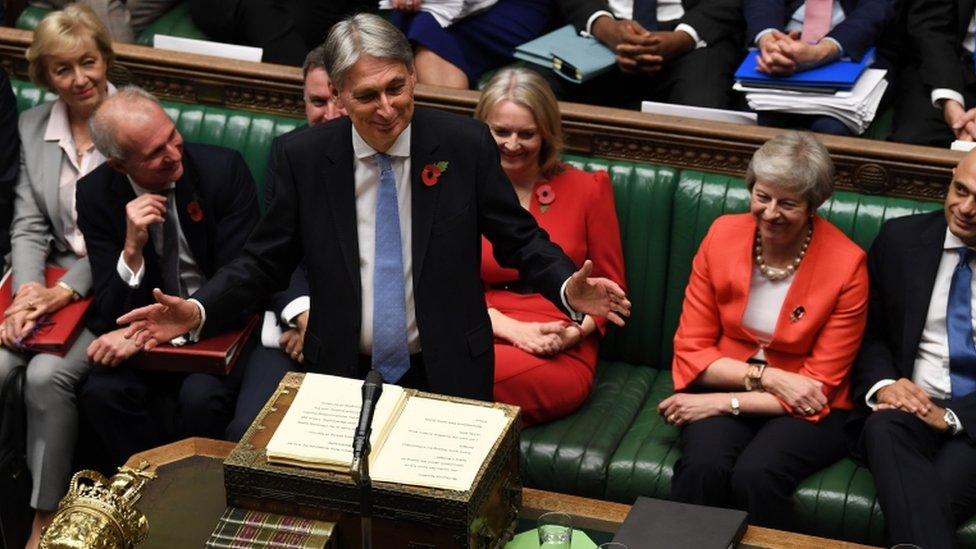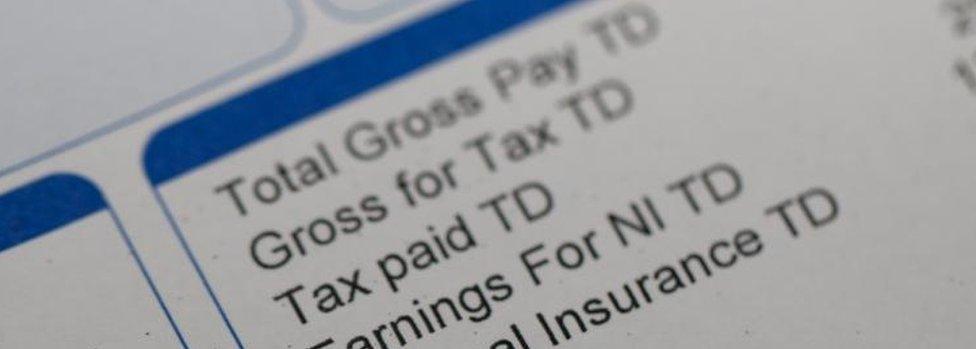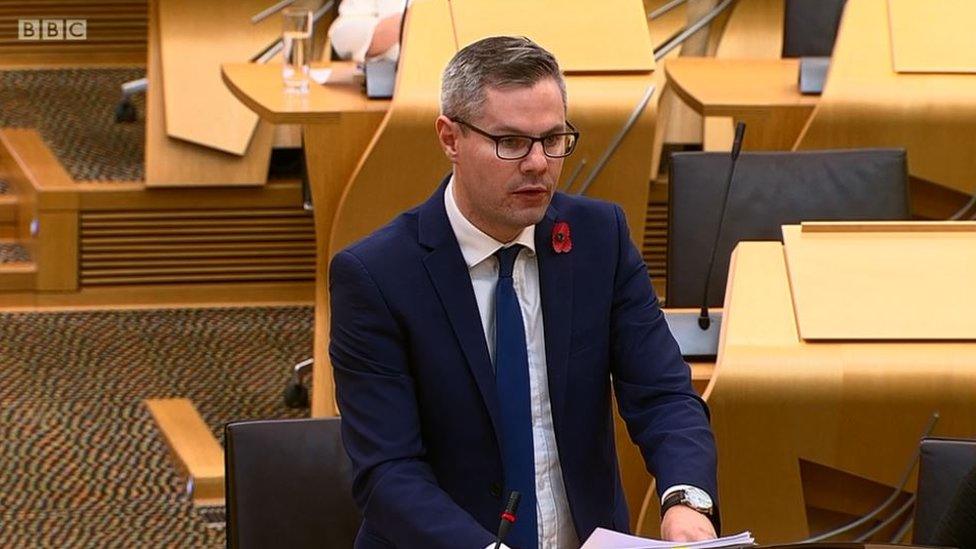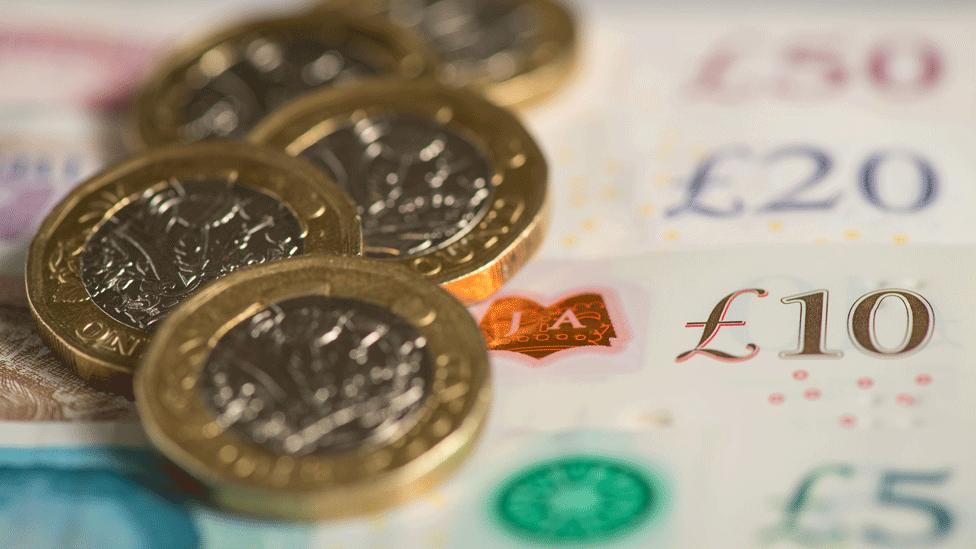What does the Budget mean for people in Scotland?
- Published

Chancellor Philip Hammond's latest UK Budget will have an impact on public and personal finances in Scotland, from government funding to how much people are taxed.
But until Scottish Finance Secretary Derek Mackay sets out his draft budget in December, many of the exact implications are hard to pinpoint. What do we know so far, and how might things pan out?

Which bits of the Budget apply to Scotland?

The freeze on whisky duty applies both north and south of the border
Basically, any parts of the Budget which refer to areas which are devolved to Holyrood - so things like health, education or justice - don't apply north of the border. Instead, the Scottish government is given a corresponding sum of money to spend as they wish.
In total, the Scottish government will get an extra £950m to spend over the next three years as a result of Mr Hammond's plans for devolved areas - principally health.
These "Barnett consequentials" (named for the Barnett formula underpinning how the devolved administrations are funded) are not ring-fenced to one area or another - although the Scottish government has already pledged that all money stemming from increased health funding in England and Wales will be given to the Scottish NHS.
Many of the Chancellor's other announcements will apply in Scotland as they do south of the border - for example the freeze on beer, whisky and fuel duties, and the increased taxes on tobacco and online gambling.
Where the most significant fiscal differences lie between Holyrood and Westminster are over tax.

What are the tax differences at present?
Earlier this year, Scotland switched to a different model of income tax rates and bands than the rest of the UK.
The UK has retained a basic rate of 20%, which under the latest Budget is levied on earnings from £12,500 to £50,000, a higher rate of 40%, on earnings above £50,000, and an additional rate of 45% on earnings above £150,000.
Scotland now has a five-band system, including a 19% "starter" rate for lower earners, a 20% basic rate, a 21% for the top half of middle-earners, a 41% higher rate and a 46% additional rate.
The thresholds where these bands kick in are also different to the system in the rest of the UK, with the 19% bracket running from the 2018-19 tax-free allowance of £11,850 up to £13,850, the 20% rate up to £24,000, the 21% band up to £43,430, and the 41% higher rate from there up to £150,000, where the 46% rate kicks in.
The changes mean some Scots pay less tax than people earning the same amount south of the border, while others pay more.
Although the full picture in Scotland is not yet clear, it is still worth trying out the BBC's Budget Calculator

How does Mr Hammond's Budget affect this?

Philip Hammond used his Budget to claim that austerity was "coming to an end"
The income tax picture is a complicated one, as much of the field is devolved to Holyrood - but some crucial parts are not.
So, Mr Hammond's announcement that the tax-free personal allowance is going up to £12,500 does apply north of the border - but his increase of the higher-rate threshold to £50,000 does not.
What this will mean depends largely on what Mr Mackay does in his budget, the draft version of which is to be published on 12 December.
The Fraser of Allander Institute say the increase in the personal allowance should give most of Scotland's taxpayers a tax cut of about £70 per year, and will take a number of Scots who are currently in the 19% bracket of income tax out of the system altogether.
This actually won't directly cost the government any extra revenue, as under the current "fiscal framework" deal Scotland's block grant will be adjusted to make sure they don't lose out.
However, the Scottish Parliament Information Centre highlights, external that Scotland has a higher proportion of lower-earning taxpayers than the rest of the UK, meaning that income tax receipts here could be hit harder than those elsewhere by reduced tax revenues.
On the higher rate, if Mr Mackay doesn't put the threshold up (or even just raises it by the rate of inflation) then he should raise more money in tax, which can then be spent on public services.
But it will mean the difference in what people pay in tax north and south of the border will grow.
The Fraser of Allander Institute say that if Mr Mackay raises the higher-rate threshold by the rate of inflation (so to about £44,500), then people earning £50,000 in Scotland would face an income tax bill more than £1,100 higher than they would if they lived south of the border.

What about other taxes?

As well as income tax, Mr Hammond's plans will have an impact on pay packets north and south of the border via National Insurance Contributions (NICs).
Most employees pay NICs at a rate of 12% up until the higher rate threshold of income tax, at which point the rate drops to 2%.
This means the overall, or "marginal" tax rate on earnings, is effectively 32% on earnings at the basic rate of income tax (20p of income tax plus 12p of NICs) - and 42% on earnings above the threshold of the higher rate (40p of income tax plus 2p of NICs).
Crucially, the point at which employee NICs drop from 12% to 2% is fixed UK-wide - despite the fact the Scottish higher rate threshold is lower than that south of the border.
That means people paying the higher rate of tax in Scotland end up paying the higher rate of NICs as well, on all earnings which fall into the gap between the UK and Scottish higher rates. Which adds up to a marginal tax rate of 53% on an expanding chunk of income.
So if the gap between the Scottish and rUK higher-rate thresholds increases - as it will, unless Mr Mackay matches or betters the Chancellor's uplift in the higher-rate threshold - then Scots earning above a certain amount (somewhere in the region of £50,000) are going to see more of their income taxed at a higher overall rate.

So what will Derek Mackay do?

Derek Mackay will set out his draft budget in December
At the moment, the mood music is that not a lot will change. Mr Mackay has talked about the current tax system as being "settled", to provide "certainty" for the rest of the current parliament.
The government says it is committed to a "fair and progressive" system of taxation, with all indications currently that thresholds will go up by the rate of interest at the most.
There are a couple of different factors at play here, effectively pushing and pulling the finance secretary in different directions.
On the one hand, he needs to come up with a sustainable budget plan, which won't annoy higher earners unduly and potentially see them finding ways of paying less tax - say by paying more into their pensions, or by moving their liabilities elsewhere.
On the other, he needs to do a budget deal with another party - and at present, the party favourite to prop up the minority SNP administration is the Greens. The Conservatives and Lib Dems have demanded that the SNP rule out a second independence referendum, more or less taking them out of the running, and an accord with Labour remains vanishingly unlikely.
The problem for Mr Mackay is that the Greens are opposed to tax cuts for the better off, and are pushing instead for an overhaul of local government financing - something that requires more money, not less.
- Published30 October 2018

- Published30 October 2018

- Published29 October 2018
